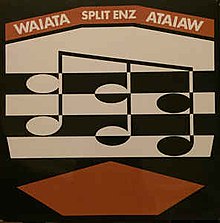Waiata (album)
 From Wikipedia - Reading time: 7 min
From Wikipedia - Reading time: 7 min
| Waiata (Corroboree) | ||||
|---|---|---|---|---|
 New Zealand release | ||||
| Studio album by | ||||
| Released | March 1981 | |||
| Recorded | AAV Studios, Melbourne, 1980 | |||
| Genre | New wave | |||
| Length | 37:20 | |||
| Label | Mushroom (Australia & New Zealand) A&M (International) | |||
| Producer | David Tickle | |||
| Split Enz chronology | ||||
| ||||
| Alternative cover | ||||
 Australian release | ||||
| Alternative cover | ||||
 International release | ||||
| Review scores | |
|---|---|
| Source | Rating |
| AllMusic | |
| Robert Christgau | C+[2] |
| The New Rolling Stone Record Guide | |
Waiata (released as Corroboree in Australia) is the seventh studio album by New Zealand new wave band Split Enz, released in March 1981. Waiata is the Māori term for song and singing, while corroboree is an Aboriginal term. According to Noel Crombie the intention was to name the album using a word from the natives of every country it was released in. This did not go ahead and the only country to adopt this change was Australia. The rest of the world kept the New Zealand title Waiata.
The songs "History Never Repeats" and "One Step Ahead" were among the first music videos aired on MTV when the cable television channel launched in the United States in 1981.[4]
Track listing
[edit]All songs written by Tim Finn, except where noted. Side one:
- "Hard Act to Follow" – 3:17
- "One Step Ahead" (Neil Finn) – 2:52
- "I Don't Wanna Dance" – 3:34
- "Iris" (N. Finn) – 2:50
- "Wail" (Eddie Rayner) – 2:49
- "Clumsy" – 3:29
Side two:
- "History Never Repeats" (N. Finn) – 3:00
- "Walking Through the Ruins" – 4:15
- "Ships" (N. Finn) – 3:01
- "Ghost Girl" – 4:26
- "Albert of India" (Rayner) – 4:03
2006 remaster
[edit]All songs written by Tim Finn, except where noted.
- "Hard Act to Follow" – 3:21
- "History Never Repeats" (N. Finn) – 2:59
- "I Don't Wanna Dance" – 3:34
- "One Step Ahead" (Neil Finn) – 2:51
- "Walking Through the Ruins" – 4:07
- "Wail" (Eddie Rayner) – 3:09
- "Iris" (N. Finn) – 2:51
- "Clumsy" – 3:32
- "Ghost Girl" – 4:39
- "Ships" (N. Finn) – 3:03
- "Albert of India" (Rayner) – 4:14
- "In the Wars" – 3:33
Personnel
[edit]Split Enz
[edit]- Tim Finn – vocals
- Neil Finn – vocals, guitar
- Noel Crombie – percussion
- Malcolm Green – drums
- Nigel Griggs – bass
- Edward Rayner – vocals, keyboards
- International Management – Nathan D. Brenner
Charts
[edit]Weekly charts
[edit]| Chart (1981) | Peak position |
|---|---|
| Australia (Kent Music Report)[5] | 1 |
| Canada[6] | 17 |
| New Zealand Albums (RMNZ)[7] | 1 |
| US Top LPs & Tape (Billboard)[8] | 45 |
Year-end charts
[edit]| Chart (1981) | Peak position |
|---|---|
| Australia (Kent Music Report)[9] | 10 |
| New Zealand Albums (RMNZ)[10] | 3 |
See also
[edit]Certifications and sales
[edit]| Region | Certification | Certified units/sales |
|---|---|---|
| Australia (ARIA)[11][12] | 3× Platinum | 210,000^ |
| Canada (Music Canada)[13] | Platinum | 100,000^ |
|
^ Shipments figures based on certification alone. | ||
References
[edit]- ^ "Corroboree Review by Chris Woodstra". AllMusic. Retrieved 29 September 2023.
- ^ Christgau, Robert. "Waiata". Robert Christgau.
- ^ Marsh, Dave; Swenson, John, eds. (1983). The New Rolling Stone Record Guide. New York: Random House/Rolling Stone Press. p. 480. ISBN 978-0-394-72107-1.
- ^ "The First 50 Music Videos Ever Played on MTV". DataLounge.com. Retrieved 15 December 2020.
- ^ Kent, David (1993). Australian Chart Book 1970–1992. St Ives, NSW: Australian Chart Book. p. 288. ISBN 0-646-11917-6. NOTE: Used for Australian Singles and Albums charting from 1970 until ARIA created their own charts in mid-1988.
- ^ "RPM Canadian Charts". Retrieved 13 July 2011.
- ^ "Charts.nz – Split Enz – Waiata". Hung Medien. Retrieved 15 November 2020.
- ^ "All Music Guide". Retrieved 11 November 2010.
- ^ Kent, David (1993). Australian Chart Book 1970–1992 (illustrated ed.). St Ives, N.S.W.: Australian Chart Book. p. 433. ISBN 0-646-11917-6.
- ^ "Top Selling Albums of 1981 — The Official New Zealand Music Chart". Recorded Music New Zealand. Retrieved 1 February 2022.
- ^ "Split Enz to Tour in 2006". Retrieved 16 February 2025.
- ^ "Major fight economics with quirky rock originals". Billboard. 12 June 1982.
- ^ "Split Enz – Part Two - The Eighties". AudioCulture. 1 April 2013. Retrieved 15 November 2020.
 KSF
KSF